|
|
|
Sort Order |
|
|
|
Items / Page
|
|
|
|
|
|
|
| Srl | Item |
| 1 |
ID:
083847
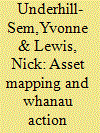

|
|
|
|
|
| Publication |
2008.
|
| Summary/Abstract |
Te Runanga o Te Rarawa is the tribal council representing the interests of the marae (tribal commons) and hapu (a subtribal kin group) that make up the iwi (a Maori tribe) of Te Rarawa in the far north of Aotearoa/New Zealand. In April 2005, officials approached us to help them secure a valuable funding stream tagged to marshalling resources for material development in the area. They sought curriculum vitae and assistance in reframing the funding specifications. Intrigued, armed with a conceptual toolkit drawn from Gibson-Graham's ideas of post-development and asset-based community mapping, and confident that we could add value, we agreed to help. This paper examines the complex politics of our involvement and our changing positioning as researcher subjects. We argue that negotiating a politics of knowledge for projects of this nature requires engagement in complex representational politics of place and divisive identity politics that rage around it. There are no easy protocols for outside researchers, but with appropriate humility and sensitivity to these politics, we can rely on, and should stand up for, the value of our work, which lies in commitments to excellence in scholarship. We cannot and should not seek to control these politics, which will chew us up and spit us out - humanely and with good grace or otherwise. However, good academic work will recognise and adapt to them. In our particular case, we argue that our work had significant value; and in this paper, we trace the production of this value
|
|
|
|
|
|
|
|
|
|
|
|
|
|
|
|
| 2 |
ID:
144260
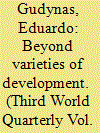

|
|
|
|
|
| Summary/Abstract |
Many South–South cooperation programmes have promoted development without fully discussing the implications of that concept. To evaluate this situation, recent heterodox development strategies are examined, particularly those under progressivist governments in South America. It is found that development strategies are certainly plural, but they all share a common pre-political background. To address this feature, the concept of ‘varieties of development’ is introduced. Then a new typology on the disputes over development is presented. Three types are recognised (controversies within a specific variety of development; disputes among different varieties; and disputes on alternatives to all varieties of development). The concept of Buen Vivir is presented as an alternative to development, and disputes of the third type, that involve this concept, are examined. Paradoxically, as the current focus of South–South cooperation is to reinforce conventional varieties of development, it is blocking alternatives, even the Southern option of Buen Vivir.
|
|
|
|
|
|
|
|
|
|
|
|
|
|
|
|
| 3 |
ID:
156651
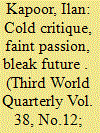

|
|
|
|
|
| Summary/Abstract |
This article carries out a psychoanalytic critique of Post-Development, arguing that the latter’s inattention to the unconscious underpinnings of power not only leaves it unable to explain why development discourse persists, but also deprives it of a radical politics, resulting in a surrender to global capitalism. Drawing on the work of Escobar, Ferguson and Esteva, the article valorises Post-Development’s important insights on the production of development discourse and its attendant power mechanisms. But using a Lacanian lens, it also probes Post-Development’s failure to address how power is mediated at the level of the subject: in maintaining that (capitalist) development is produced discursively in a cold, impersonal way (like an ‘anti-politics machine’), Post-Development ignores the fact that such power is only able to take hold, expand and, crucially, persist through unconscious libidinal attachments (e.g. desires, enjoyment). This failure leaves Post-Development with few resources – beyond localised resistance (Escobar, Esteva) or the call for a universal basic income (Ferguson) – to address the structural challenges of global capitalism. Psychoanalytically speaking, such a (Left) position appears to manifest a secret desire that nothing too much must change: Post-Development may well criticise the disciplinary mechanisms of neoliberal development, but ultimately it engages in an unconscious acceptance of capitalism.
|
|
|
|
|
|
|
|
|
|
|
|
|
|
|
|
| 4 |
ID:
161582
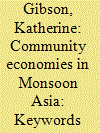

|
|
|
|
|
| Summary/Abstract |
A diversity of place‐based community economic practices that enact ethical interdependence has long enabled livelihoods in Monsoon Asia. Managed either democratically or coercively, these culturally inflected practices have survived the rise of a cash economy, albeit in modified form, sometimes being co‐opted to state projects. In the modern development imaginary, these practices have been positioned as ‘traditional’, ‘rural’ and largely superseded. But if we read against the grain of modernisation, a largely hidden geography of community economic practices emerges. This paper introduces the project of documenting keywords of place‐based community economies in Monsoon Asia. It extends Raymond William’s cultural analysis of keywords into a non‐western context and situates this discursive approach within a material semiotic framing. The paper has been collaboratively written with co‐researchers across Southeast Asia and represents an experimental mode of scholarship that aims to advance a post‐development agenda.
|
|
|
|
|
|
|
|
|
|
|
|
|
|
|
|
| 5 |
ID:
169214
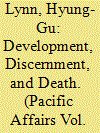

|
|
|
|
|
| Summary/Abstract |
Ron Dore’s 1977 article in Pacific Affairs, “South Korean Development in Wider Perspective,” is a rare example of the scholar known for his writings on Japan applying his analytical lens on South Korea. What were some of this article’s most notable areas of foresight and elision related to development studies? This essay answers this question by interpreting connections to publications before and after 1977 to analyze areas of insight under the rubric of “discernment” and overlooked subjects under “death.” On one hand, Dore’s essay was ahead of the curve in its deft foreshadowing of post-developmentalist, varieties of capitalism, and developmental state approaches to economic development. On the other, Dore sidestepped the effects of death on economic development in three forms: literal—effects of changing mortality rates on investments in education and human capital; industries related to death—wars, munitions production and arms expenditures; and the aftereffects of the death of a scholar—the revisiting and renewal of debates that can sometimes emerge as a result.
|
|
|
|
|
|
|
|
|
|
|
|
|
|
|
|
| 6 |
ID:
078951
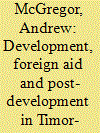

|
|
|
|
|
| Publication |
2007.
|
| Summary/Abstract |
Post-development theories have successfully challenged many of the ways in which we think about development but have yet to substantially influence development practice. In this paper I explore what opportunities exist for applying post-development ideas within the current development apparatus of Timor-Leste. Four types of community-focused programmes are analysed: sectoral project-based initiatives, institutional capacity-building programmes, community partnerships and small grants programmes. While alternative opportunities are clearly shown to be present, it is argued that they are rarely realised because of the overwhelming priority to produce better agents of development, rather than those able to pursue 'alternatives-to-development'. The paper concludes by suggesting that the development apparatus itself may not be inherently faulted; instead this apparatus could be usefully utilised by those inspired by alternative imaginaries to pursue post-development goals.
|
|
|
|
|
|
|
|
|
|
|
|
|
|
|
|
| 7 |
ID:
090016


|
|
|
|
|
| Publication |
2009.
|
| Summary/Abstract |
The contracting out to private providers of services previously delivered within the state has been framed critically as 'hollowing out' and read for its erosion of social democracy, social justice and welfare, as well as its inefficiencies in practice. It is commonly dismissed as neoliberalism. In this paper, we highlight the gains made through this new contractualism by Te Oranga, the Family, Health and Education division of Te Runanga o Te Rarawa located in the Far North of New Zealand. Our aim is not to narrate the exceptional, but to point to the inherent resistances to totalising projects residing in agency and place. Placed at the service of a deep sense of community being and community good rather than self-interest, delivery contracts have enabled Te Oranga to pursue an alternative form of local development and craft a set of progressive spaces. Although highly contingent upon powerful Maori political projects, we argue that the case suggests that gains may be sought in other settings, albeit partial, temporary, and politically contingent. We thus offer a more nuanced account of neoliberalism by highlighting its agency, fractures, politics, and contradictions, and by demonstrating that actualised neoliberalisms are co-constituted with other political projects.
|
|
|
|
|
|
|
|
|
|
|
|
|
|
|
|
| 8 |
ID:
156649
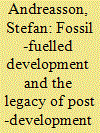

|
|
|
|
|
| Summary/Abstract |
This article examines the legacy of Post-Development theory, in particular its relevance and applicability to debates about Africa’s future. It scrutinises Post-Development theory, and its claims about the end of development, through the prisms of Africa’s continued pursuit of development and its political economy of energy. It considers the impact of these aspects of Africa’s developmental efforts on the ability of Post-Development theory to remain relevant in light of recent developments. Revisiting basic claims of Post-Development theory provides insights into the enduring disconnect and incommensurability between Africa’s twenty-first century socio-economic trajectories and the core assumptions of Post-Development theory.
|
|
|
|
|
|
|
|
|
|
|
|
|
|
|
|
| 9 |
ID:
163066
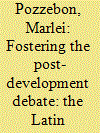

|
|
|
|
|
| Summary/Abstract |
This essay revisits the historical development of a concept – tecnologia social – as one avenue for discussing alternatives to post-development, arguing that the Western-based historical path of technology development is one of the main sources of growing human impoverishment, social inequalities and economic dependency. The concept of tecnologia social points towards political processes that create opportunities to redefine the arrangements among social groups, artefacts and methods used in everyday life, particularly for production and consumption. Because the post-development debate has been criticised for formulating a sound and strong critique to mainstream development but failing to propose concrete empirical alternatives, we seek to foster the debate through the Latin American concept of tecnologia social.
|
|
|
|
|
|
|
|
|
|
|
|
|
|
|
|
| 10 |
ID:
156654
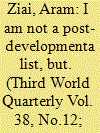

|
|
|
|
|
| Summary/Abstract |
During the course of the 1990s, the Post-Development school emerged as an innovative though controversial approach in development studies. The article examines its critical reception in the textbooks and the extent to which its authors and arguments have become influential. It argues that the relationship between development studies and Post-Development is characterised simultaneously by (sometimes explicit, sometimes implicit) rejection and integration. Examining a number of current development studies textbooks, it illustrates the growing influence of Post-Development arguments and how they have been tacitly or consciously taken up while often rejecting Post-Development per se.
|
|
|
|
|
|
|
|
|
|
|
|
|
|
|
|
| 11 |
ID:
156647
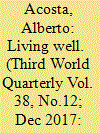

|
|
|
|
|
| Summary/Abstract |
In various parts of the world, growing and serious problems, especially economic, social and environmental, are increasingly calling into question the conventional ideas of progress. The lives of human beings are in danger. We are in ‘the age of survival’, a sort of crossroads in which the future of the human species is defined. That is why alternatives that exceed the dominant concepts typical of Modernity are arising from many sectors and places. Above all, natives are determined to recover their origins and even to strengthen their ancestral practices, from their past to project into the future. And there are those who try to build bridges between these different shores, from which it may be possible to build other worlds where life with dignity for all beings existing on the planet is a possibility.
|
|
|
|
|
|
|
|
|
|
|
|
|
|
|
|
| 12 |
ID:
156653
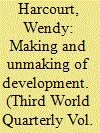

|
|
|
|
|
| Summary/Abstract |
This article explores the ways in which western modernity, as Boaventura De Sousa Santos suggests, can play tricks on intellectuals when we try to teach revolutionary ideas in reactionary institutions. I reflect on my efforts to use Post-Development (PD) as a tool to engage students in critical reflections on development in a post graduate course in 2015/2016. One of their assignments was to create an International Institute of Social Studies (ISS) Development Dictionary emulating the Sachs’s collection. The results were mixed. On the one hand, they produced wonderful digital collations of concepts, ideas and critiques, but on the other hand, many felt that learning about PD had turned their world upside down. Given the strong reactions of the students, and also my colleagues, I reflect on the possibilities and also the problems of using PD as a tool to teach development studies to international students (most of whom are from the Global South). My experiment in asking students to engage in their own ‘unmaking of development’ recorded in their evaluations, a series of interviews, and my own and other colleagues’ reflections sets out the difficulty of unsettling apparent truths of development processes even in progressive institutes at the interface of activism and academe.
|
|
|
|
|
|
|
|
|
|
|
|
|
|
|
|
| 13 |
ID:
165072
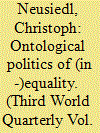

|
|
|
|
|
| Summary/Abstract |
This article aims to add a new line of research to the post-development school of thought. Drawing on the many evident yet rarely noticed parallels between post-development and (post-)anarchism, I develop an understanding of ‘anarchistic post-development’ as a politics based on what French philosopher Jacques Rancière calls ‘the presupposition of equality’. I further connect this with Arturo Escobar and Marisol De la Cadena’s concept of political ontology, suggesting that we can make sense of and analyse both contemporary ‘Development’ projects as well as anarchistic post-developmental ‘alternatives to Development’ through the lens of what I call ‘the ontological politics of (in-)equality’. To substantiate my points, I will draw on the recent case of a Mâori tribe who won a historical legal battle to declare the Whanganui River a living entity.
|
|
|
|
|
|
|
|
|
|
|
|
|
|
|
|
| 14 |
ID:
163708
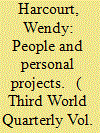

|
|
|
|
|
| Summary/Abstract |
In response to Juan David Parra Heredia’s criticism of her earlier article about her use of post-development as a tool in teaching development studies, Wendy Harcourt reflects further on how the course analysed in 2016 has evolved in the last three years and corrects the misreadings of the pedagogical position-taking by the teachers in the course.
|
|
|
|
|
|
|
|
|
|
|
|
|
|
|
|
| 15 |
ID:
163707
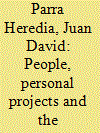

|
|
|
|
|
| Summary/Abstract |
This article makes a critique of using Post-Development as a tool in teaching an introductory course in development studies. Such a debate was initiated by Harcourt in a previous issue of Third World Quarterly as she reflected on her teaching experience in a European Institution. Harcourt concludes that the lack of engagement of some of the students in the course reflects the unwillingness of privileged middle-class pupils to challenge western lifestyles. I draw on a critical realist meta-theory about the process of learning in higher education to challenge the ontological support of that conclusion and invite her to reconsider her teaching strategy.
|
|
|
|
|
|
|
|
|
|
|
|
|
|
|
|
| 16 |
ID:
156644
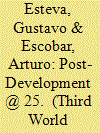

|
|
|
|
|
| Summary/Abstract |
Escobar and Esteva engage in a retrospective conversation on Post-Development, reassessing the critiques and discussing openly the meaning of ‘living beyond development’ today. Some of the topics covered include: how the development discourse has shaped mentalities and practices; the tensions and contradictions in the institutional world, trapped in their compulsion for development in the face of the multiple crisis plaguing the world; the new manifestations of the resistance to development; and the relevant experiences that anticipate the new worlds beyond development and patriarchal capitalist modernity and towards the pluriverse.
|
|
|
|
|
|
|
|
|
|
|
|
|
|
|
|
| 17 |
ID:
156643
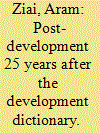

|
|
|
|
|
| Summary/Abstract |
Few books in the history of development studies have had an impact like The Development Dictionary – A Guide to Knowledge as Power, which was edited by Wolfgang Sachs and published by Zed Books in 1992, and which was crucial in establishing what has become known as the Post-Development (PD) school. This special issue is devoted to the legacy of this book and thus to discussing PD.
|
|
|
|
|
|
|
|
|
|
|
|
|
|
|
|
| 18 |
ID:
135039


|
|
|
|
|
| Summary/Abstract |
Because of the absence of evidence to show for its utility, the notion of ‘development’ has been fraught with many debates over the years. This paper is concerned with re-examining the future of development studies, based on its past and present trajectories. The argument here is that development may be useful if its norms and practices become context-specific and are made to benefit its purported beneficiaries. The chronology spans the period after World War II to the present day, and thus covers theories that envision alternatives. While this chronology is overlapping, we hope to show that development studies has been marked by both continuities and discontinuities.
|
|
|
|
|
|
|
|
|
|
|
|
|
|
|
|
| 19 |
ID:
141897
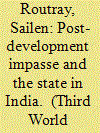

|
|
|
|
|
| Summary/Abstract |
After discussing the various points of departure suggested by scholars of development, this paper argues that, in the context of India, one way out of the post-development impasse lies in shifting the focus from development politics to the workings of the developmental state on the ground, and to change the methodological vantage point to ethnography. It is suggested that this change in approach would provide fresh insights into the workings of the developmental state and into the process of development in India.
|
|
|
|
|
|
|
|
|
|
|
|
|
|
|
|
| 20 |
ID:
106671
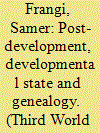

|
|
|
|
|
| Publication |
2011.
|
| Summary/Abstract |
This article investigates the fate of two trends in development studies-post-development and the 'developmental state'-in order to question the critical purchase of the genealogical mode of critique in this discipline. These two trends enact a critique of the orthodox discourse of development that problematises its understanding of history, self-perception and practical implications and is akin to a genealogical form of critique. Yet the success of these trends in the discipline of development has been relatively minimal, compared to the insights it has generated in other academic disciplines. This outcome raises questions as to the problem-space of development and the structure of the arguments in this discipline. More specifically, the article argues that the prescriptive bent of this discipline imposes specific requirements on critical discourse, requirements that make it less amenable to this form of genealogical critique. The article concludes on the potential insights of this form of critique when filtered through the prescriptive bias of this field.
|
|
|
|
|
|
|
|
|
|
|
|
|
|
|
|
|
|
|
|
|